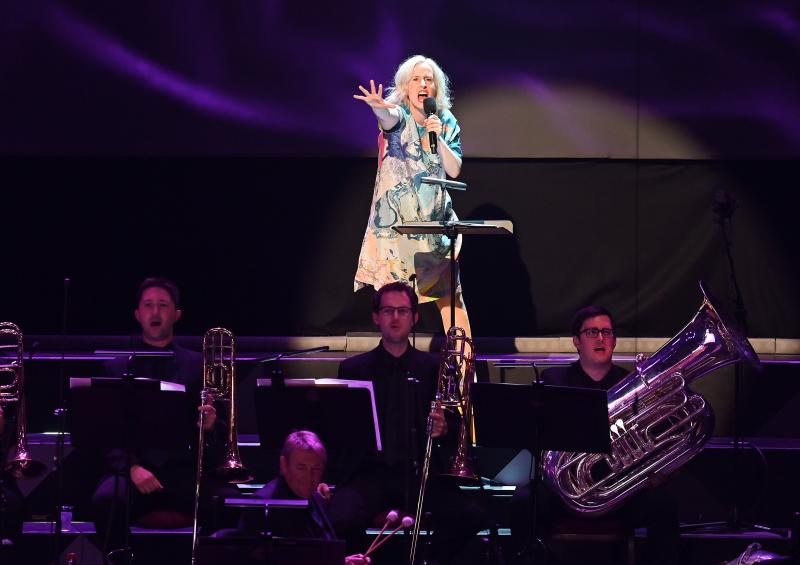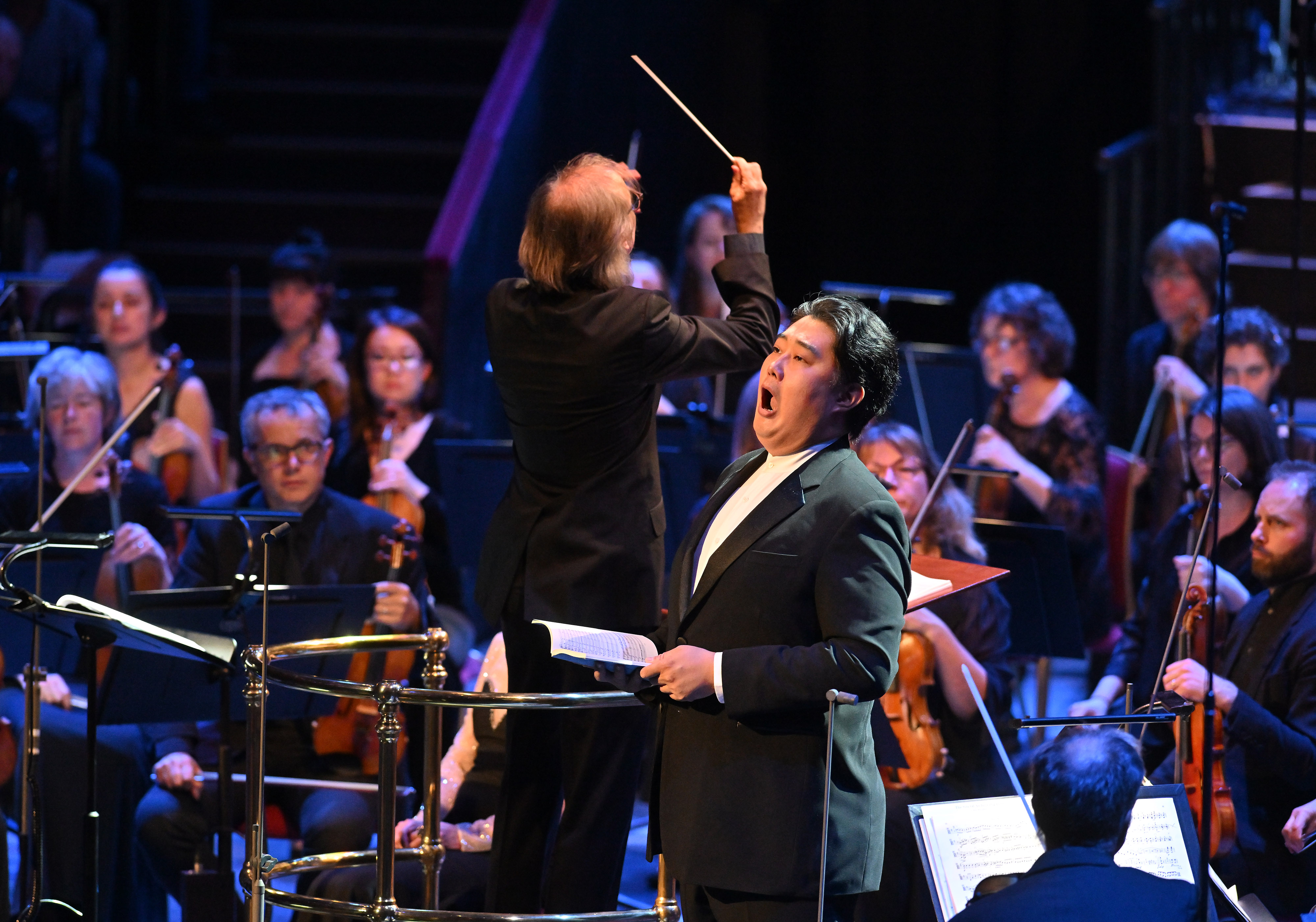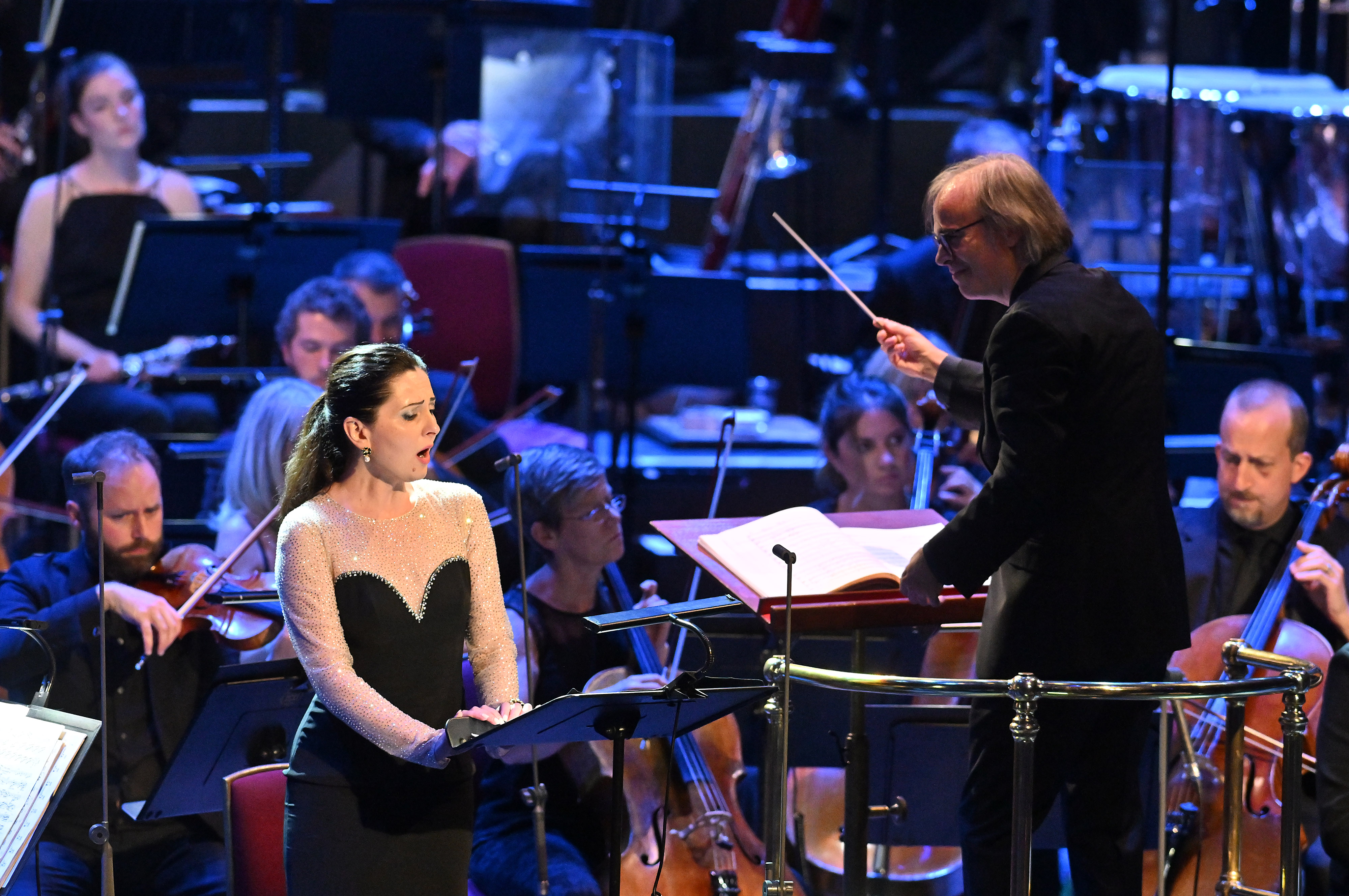Prom 17, Walshe, Tsallagova, Shenyang, NYC, BBCSSO, Volkov review - the sublime and the (enjoyably) ridiculous | reviews, news & interviews
Prom 17, Walshe, Tsallagova, Shenyang, NYC, BBCSSO, Volkov review - the sublime and the (enjoyably) ridiculous
Prom 17, Walshe, Tsallagova, Shenyang, NYC, BBCSSO, Volkov review - the sublime and the (enjoyably) ridiculous
Timeless anxieties bind a Romantic masterwork and postmodern musical cabaret

The giraffe still baffles me. This model beast appeared stage right at the Royal Albert Hall during Jennifer Walshe’s The Site of an Investigation, only to be loudly wrapped by a pair of percussionists and then removed. A critique of mindless consumerism, a satire on the destructive domination of nature (both among this work’s sprawl of themes), or a little absurdist interlude of the kind Walshe evidently enjoys?
Proms bills often test your skill in joining the dots between wholly disparate pieces. And a programme that followed this musical and verbal bid to reproduce the data overload of a net-browsing session with Brahms’s German Requiem did so more enigmatically than most. Links, though, did exist – even if the National Youth Choir of Great Britain’s majestic account of Brahms’s supreme act of non-dogmatic remembrance and consolation inevitably put the evening’s first half in the shade.
The Site of an Investigation was funny, flawed and fascinating: exactly the sort of innovation that the Proms (in part) exists to promote. Walshe has an impeccably avant-garde background (she has taught at Darmstadt Summer Courses). The Site, though, steers more towards the spaced-out galaxy of performance art, electronica, ambient music and the various rock branches of techno-futurism. Devotees of Laurie Anderson, Brian Eno and (especially) Björk might have felt quite at home in the Royal Albert Hall. Walshe scooted around its stage as she spoke, and occasionally sang, the sections of a mixed-bag text that mimics our drift around cyberspace as we plunge through its endless meteor-showers of disconnected data.  Walshe wrote the piece in 2018, and her words stitch a loose tapestry of modern anxieties, from the speeding-up of life online to “the homophobia, the institutional racism, the internalised misogyny”, the yearning to conquer death through artificial intelligence, the evils of the global business elite, and the micro-plastics that pollute our oceans and our cells. As you would expect, none of these hulking topics can get more than a perfunctory airing. Walshe’s monologue becomes something of a sub-Beckettian litany of the abstract sorrows that plague the degree-holding masses of the West – at times, more emo than Eno.
Walshe wrote the piece in 2018, and her words stitch a loose tapestry of modern anxieties, from the speeding-up of life online to “the homophobia, the institutional racism, the internalised misogyny”, the yearning to conquer death through artificial intelligence, the evils of the global business elite, and the micro-plastics that pollute our oceans and our cells. As you would expect, none of these hulking topics can get more than a perfunctory airing. Walshe’s monologue becomes something of a sub-Beckettian litany of the abstract sorrows that plague the degree-holding masses of the West – at times, more emo than Eno.
It’s delivered, though, with wit and flair, even if you do hanker for a Björk-strength voice – and Björk-standard lyrics – behind the eclectic dance of grand ideas. Walshe’s music, however, proves eminently accessible. Its fragmentary late-Romantic swell of string and brass evokes a lost sonic wholeness: part-nostalgia, part-parody. Orchestral passages of minimalist chug and drive set the mood, while her snatches of found sound hark back to the Modernist urge to score the cacophonous symphony of urban life. Think, for instance, of Varèse’s Ameriques – except that Walshe’s brave new world now exists in cyberspace. Ilan Volkov led a spirited response to the music’s (often tuneful and tonal) eccentricities from the BBCSSO. And they played Walshe’s multi-media game with relish – coloured streamers on the wind machine and all.  Death – of our bodies, of the planet – and our techno-driven plans to overcome it haunts her Site. It ends with an injunction not to pursue immortality but “Just take a nap, and sweet dreams”. You can spot the connection with Brahms’s German Requiem, which offers earthly comfort but not resurrection. Even so, we ascended after the interval into the sublime from the ridiculousness of online existence. It’s astonishing to learn that this towering humanistic elegy for the composer’s mother and his mentor – Robert Schumann – never found a place at the Proms until 1965. Yet the hall’s cavern can welcome a well-drilled massed choir like chorus-master Ben Parry's National Youth Choir of Great Britain (NYC) (pictured below) as few other venues can. The young singers responded superbly to the demands of the space. Meanwhile, Russian soprano Elena Tsallagova and Chinese bass-baritone Shenyang were stalwart and moving during the sections in which soloists dialogue with chorus and orchestra.
Death – of our bodies, of the planet – and our techno-driven plans to overcome it haunts her Site. It ends with an injunction not to pursue immortality but “Just take a nap, and sweet dreams”. You can spot the connection with Brahms’s German Requiem, which offers earthly comfort but not resurrection. Even so, we ascended after the interval into the sublime from the ridiculousness of online existence. It’s astonishing to learn that this towering humanistic elegy for the composer’s mother and his mentor – Robert Schumann – never found a place at the Proms until 1965. Yet the hall’s cavern can welcome a well-drilled massed choir like chorus-master Ben Parry's National Youth Choir of Great Britain (NYC) (pictured below) as few other venues can. The young singers responded superbly to the demands of the space. Meanwhile, Russian soprano Elena Tsallagova and Chinese bass-baritone Shenyang were stalwart and moving during the sections in which soloists dialogue with chorus and orchestra.
In contrast to Verdi’s anguished Latin version of the same ritual five years later – the heaven-storming cry of a sort of Catholic atheist – Brahms’s music, with his idiosyncratic German Bible texts, mines deep reserves of lyricism and tenderness under the shell of grief. The problem for singers and players is to prevent this hard-won serenity from softening into sentimental mush. Volkov and the choir, abetted by the tight and fierce playing of the BBCSSO, managed exactly that. If the choir’s opening invocation of the blessed (“Selig”) peace of those we have lost floated gorgeously and seamlessly down from the beyond, the yearning strings and questing woods hinted at the stress and worry that consumes us in the mortal world – in Brahms’s just as in Walshe’s era.  Brahms’s choral writing draws grandly and freely from the musical past, nourishing itself from Bach and the Renaissance masters. A vast regiment of voices can overwhelm its allusive subtlety. However, The NYC and Volkov kept their textures firm and boundaries admirably sharp. We heard some thrilling exchanges between high and low voices, and choral climaxes that combined earth-rocking force with pinpoint focus. The great funeral march (“For all flesh is grass”) had all the vocal security, rhythmic solemnity – and transfixing impact – it deserves. When Shenyang (pictured above) entered to meditate on “the measure of my days”, he brought not just vocal solidity but warmth, grace and fervour to his task. This felt, though, like the choir’s evening, and their mighty Bachian fugue vindicating “the souls of the righteous” pretty much stole the show.
Brahms’s choral writing draws grandly and freely from the musical past, nourishing itself from Bach and the Renaissance masters. A vast regiment of voices can overwhelm its allusive subtlety. However, The NYC and Volkov kept their textures firm and boundaries admirably sharp. We heard some thrilling exchanges between high and low voices, and choral climaxes that combined earth-rocking force with pinpoint focus. The great funeral march (“For all flesh is grass”) had all the vocal security, rhythmic solemnity – and transfixing impact – it deserves. When Shenyang (pictured above) entered to meditate on “the measure of my days”, he brought not just vocal solidity but warmth, grace and fervour to his task. This felt, though, like the choir’s evening, and their mighty Bachian fugue vindicating “the souls of the righteous” pretty much stole the show.
Volkov ensured that the NYC made their mood and tempo changes fast and sharp. They mastered the tricky pastoral lilt and waltz-like swing of “How amiable are thy tabernacles”, before Tsallagova (pictured below) unleashed her full-toned, smoky, rather old-fashioned and vibrato-heavy soprano on the lullaby of “As one whom his mother comforteth, so I shall comfort you”. The choir, though, still had some thrilling coups in reserve. Their “last trump” chorus struck like a thunderbolt. Clear edges, even to the most ferocious fortissimi, and well-disciplined entries made this a smart barrage, not scattergun noise. In the finale, the peace that descends as the departed return had a properly angelic glow.  This was an audacious Proms pairing, but one that raised more questions that it could answer. The gulf between the two halves had little to do with the transition from an age of faith to one of doubt. Brahms and his contemporaries already lived with profound doubt as traditional piety eroded. However, he could still embrace the musical idioms of the past with total artistic and emotional commitment, without irony or pastiche. Model giraffes aside, can any composer do that now?
This was an audacious Proms pairing, but one that raised more questions that it could answer. The gulf between the two halves had little to do with the transition from an age of faith to one of doubt. Brahms and his contemporaries already lived with profound doubt as traditional piety eroded. However, he could still embrace the musical idioms of the past with total artistic and emotional commitment, without irony or pastiche. Model giraffes aside, can any composer do that now?
rating
Share this article
The future of Arts Journalism
You can stop theartsdesk.com closing!
We urgently need financing to survive. Our fundraising drive has thus far raised £49,000 but we need to reach £100,000 or we will be forced to close. Please contribute here: https://gofund.me/c3f6033d
And if you can forward this information to anyone who might assist, we’d be grateful.

Subscribe to theartsdesk.com
Thank you for continuing to read our work on theartsdesk.com. For unlimited access to every article in its entirety, including our archive of more than 15,000 pieces, we're asking for £5 per month or £40 per year. We feel it's a very good deal, and hope you do too.
To take a subscription now simply click here.
And if you're looking for that extra gift for a friend or family member, why not treat them to a theartsdesk.com gift subscription?
more Classical music
 Kempf, Brno Philharmonic, Davies, Bridgewater Hall, Manchester review - European tradition meets American jazz
Bouncing Czechs enjoy their Gershwin and Brubeck alongside Janáček and Dvořák
Kempf, Brno Philharmonic, Davies, Bridgewater Hall, Manchester review - European tradition meets American jazz
Bouncing Czechs enjoy their Gershwin and Brubeck alongside Janáček and Dvořák
 Solomon, OAE, Butt, QEH review - daft Biblical whitewashing with great choruses
Even a top soprano and mezzo can’t make this Handel paean wholly convincing
Solomon, OAE, Butt, QEH review - daft Biblical whitewashing with great choruses
Even a top soprano and mezzo can’t make this Handel paean wholly convincing
 Two-Piano Gala, Kings Place review - shining constellations
London Piano Festival curators and illustrious friends entertain and enlighten
Two-Piano Gala, Kings Place review - shining constellations
London Piano Festival curators and illustrious friends entertain and enlighten
 Echo Vocal Ensemble, Latto, Union Chapel review - eclectic choral programme garlanded with dance
Beautiful singing at the heart of an imaginative and stylistically varied concert
Echo Vocal Ensemble, Latto, Union Chapel review - eclectic choral programme garlanded with dance
Beautiful singing at the heart of an imaginative and stylistically varied concert
 Scott, Irish Baroque Orchestra, Whelan, RIAM, Dublin review - towards a Mozart masterpiece
Characteristic joy and enlightenment from this team, but a valveless horn brings problems
Scott, Irish Baroque Orchestra, Whelan, RIAM, Dublin review - towards a Mozart masterpiece
Characteristic joy and enlightenment from this team, but a valveless horn brings problems
 Classical CDs: Voice flutes, flugelhorns and froth
Baroque sonatas, English orchestral music and an emotionally-charged vocal recital
Classical CDs: Voice flutes, flugelhorns and froth
Baroque sonatas, English orchestral music and an emotionally-charged vocal recital
 Kanneh-Mason, Britten Sinfonia, Shave, Milton Court - a grin and a big beaming smile
A pair of striking contemporary pieces alongside two old favourites
Kanneh-Mason, Britten Sinfonia, Shave, Milton Court - a grin and a big beaming smile
A pair of striking contemporary pieces alongside two old favourites
 theartsdesk at the New Ross Piano Festival - Finghin Collins’ musical rainbow
From revelatory Bach played with astounding maturity by a 22 year old to four-hand jazz
theartsdesk at the New Ross Piano Festival - Finghin Collins’ musical rainbow
From revelatory Bach played with astounding maturity by a 22 year old to four-hand jazz
 First Person: Manchester Camerata's Head of Artistic Planning Clara Marshall Cawley on questioning the status quo
Five days of free events with all sorts of audiences around Manchester starts tomorrow
First Person: Manchester Camerata's Head of Artistic Planning Clara Marshall Cawley on questioning the status quo
Five days of free events with all sorts of audiences around Manchester starts tomorrow
 Goldscheider, Brother Tree Sound, Kings Place review - music of hope from a young composer
Unusual combination of horn, strings and electronics makes for some intriguing listening
Goldscheider, Brother Tree Sound, Kings Place review - music of hope from a young composer
Unusual combination of horn, strings and electronics makes for some intriguing listening

Add comment